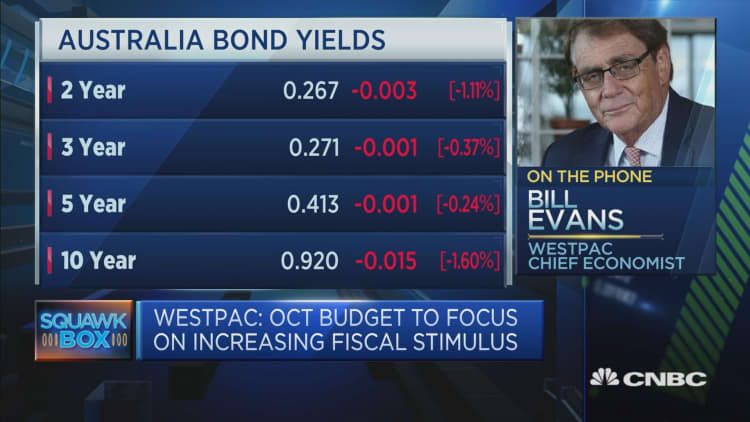Australia will reveal its first economic and fiscal update since the coronavirus outbreak on Thursday, as the nation navigates its biggest economic downturn in almost three decades.
"The coronavirus crisis has hit our economy hard, and it's hit our budget hard," Australia's Finance Minister Mathias Cormann told CNBC, just hours after liaising with fellow global policymakers at the G20 Finance Ministers and Central Bank Governors Meeting.
"We've had to make policy decisions with a fiscal impact of $56 billion (AUD) ($39 billion USD), and on top of that, there will be the impact of the economic hit on revenue and expenditure across the board," he added.
The July Economic Statement comes ahead of the government's official budget in October. Analysts say it will show the government's economic forecasts for the next two fiscal years, while outlining the next stage of the policy response and likely record budget deficits to follow as a result.
"We estimate deficits of $95 billion, 4.8% of GDP, for 2019-20," Westpac Chief Economist Bill Evans wrote in a research note this weekend. The firm forecasts a budget deficit in 2020-2021 of $240 billion and is expecting a further large deficit of the order of $150 billion in 2021-2022.
"Falling confidence amid concerns about 'second waves' will surely prompt the government to confirm a set of policy initiatives that will extend its stimulatory stance although there will be a significant wind down of that stimulus," Evans added.
Government to right-size job support measures despite rising virus count
Among the expected announcements on Thursday will be a review of the government's "JobKeeper" wage subsidy scheme – which allows eligible employers to receive $1,500 ($1,050 USD) per employee per fortnight. The measure was well received by domestic businesses and protected jobs, but will likely cost the federal government $70 billion before it expires in September.
"The outlook right now is better than what we feared earlier this year, and some of the costings that we made for some programs like JobKeeper at the beginning, turned out to be less costly than initially anticipated," Cormann said.
"There will be a further period of support for those businesses who really need it," he added, saying support will be "more targeted" to ensure the fiscal boost provided by the government goes to those businesses who need it most.

The focus on jobs comes as Australia battles to confront a surge in COVID-19 cases in its two most populous cities of Sydney and Melbourne. In Melbourne, in the state of Victoria, 363 new cases of the coronavirus were recorded on Sunday after 217 cases the previous day.
"That's the unknown for the next quarter," Cormann said, warning that rising cases and extended lockdowns could threaten to prolong the economic malaise. Australia's unemployment rate hit 7.4% in June, the highest level in 22 years.
"The June quarter was always going to be the worst quarter," Cormann said. "Seven point four percent is high for us, but it's not as high as we feared it would be. Back in March, when we were looking ahead, our expectation was for an unemployment rate of about ten percent. It has come in quite a bit below that."

"I think the Australian economy needs more support over the next six to twelve months," AMP Capital's Diana Mousina told CNBC. "We think the unemployment rate will probably remain between 7 to 8 percent over the next year, which is very high."
"Before coronavirus, we were talking about a five percent unemployment rate," she added.
G20 mindful of stimulus "taper-tantrum" as economies recover
Cormann said governments need to work together to avoid a disruption as crisis era fiscal stimulus begins to be tapered around the world. "It's certainly true that there is a risk here," he said.
"It is Australia's position within the G20 that there has to be a globally coordinated approach to the exit from this transitional fiscal support into all of our economies," he added. "It's not going to be fiscally sustainable to provide fiscal support at the same level that governments around the world are currently providing it on an ongoing basis. There will have to be a transition into the new normal."


